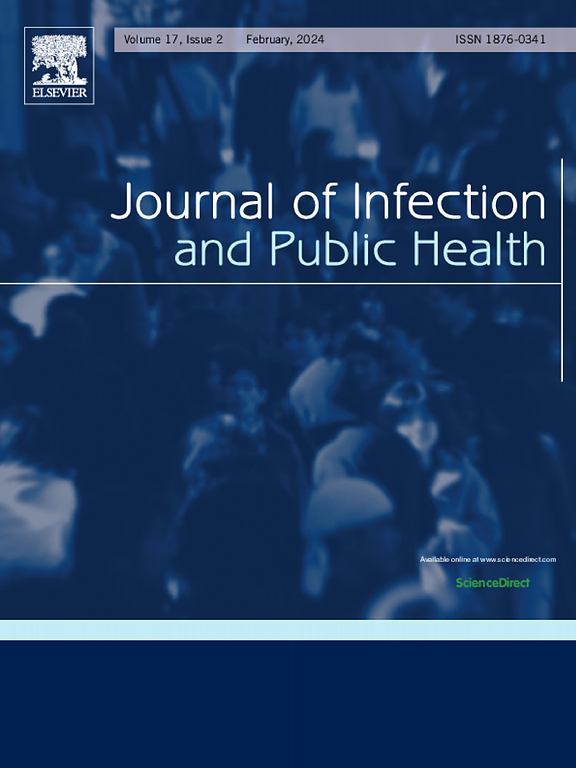An unexpected dengue outbreak in Taiwan, 2023: A retrospective analysis of potential risk factors
IF 4
3区 医学
Q1 INFECTIOUS DISEASES
引用次数: 0
Abstract
Background
Taiwan experienced a major dengue outbreak in 2023 following the relaxation of COVID-19 border controls. The contributing factors remained unclear. This study investigated potential virological, immunological, and clinical drivers.
Methods
We retrospectively analyzed laboratory-confirmed dengue virus (DENV) infections at a tertiary care hospital in southern Taiwan. Serotypes were identified by qRT-PCR. Viral origins were assessed through phylogenetic and envelope (E) gene amino acid analyses. Clinical features of DENV-1 and DENV-2 cases were compared. Neutralization and antibody-dependent enhancement (ADE) were evaluated using PRNT and ADE assays.
Results
DENV-1 and DENV-2 were identified as the predominant circulating serotypes. Clinical analysis revealed that DENV-2 infection was significantly associated with older age, diabetes mellitus, hypertension, and elevated hematocrit levels (p < 0.05), and these associations remained statistically significant in multivariate analysis. Phylogenetic analysis showed that DENV-1 isolates belonged to genotypes I and IV, while DENV-2 strains were of the cosmopolitan genotype. These viruses clustered closely with strains from Southeast Asia. Amino acid analysis indicated that DENV-1 strains exhibited 2–10 substitutions relative to 2014 isolates, while DENV-2 strains closely matched those from 2015. Sera from the 2014–2015 outbreaks demonstrated potent homotypic but limited heterotypic neutralization. ADE was observed in heterotypic infection contexts.
Conclusions
The 2023 dengue outbreak in Taiwan was driven by co-circulation of DENV-1 and DENV-2, limited heterotypic immunity, and ADE. These findings highlight the importance of integrated virological surveillance, genotype monitoring, and immunological assessment to inform dengue control strategies in non-endemic regions experiencing imported viral threats.
2023年台湾意外登革热疫情:潜在危险因素的回顾性分析
背景:2023年,在放松COVID-19边境管制后,台湾经历了一次重大的登革热疫情。致病因素仍不清楚。本研究调查了潜在的病毒学、免疫学和临床驱动因素。方法回顾性分析台湾南部某三级医院实验室确诊的登革病毒感染病例。采用qRT-PCR方法鉴定血清型。通过系统发育和包膜(E)基因氨基酸分析评估病毒起源。比较DENV-1和DENV-2病例的临床特征。中和和抗体依赖性增强(ADE)采用PRNT和ADE测定。结果denv -1和DENV-2为主要的流行血清型。临床分析显示,DENV-2感染与年龄、糖尿病、高血压、红细胞压积升高有显著相关性(p <; 0.05),多因素分析中这些相关性仍有统计学意义。系统发育分析表明,DENV-1分离株为ⅰ和ⅳ基因型,DENV-2分离株为世界性基因型。这些病毒与来自东南亚的毒株紧密聚集。氨基酸分析结果表明,DENV-1菌株与2014年的DENV-1菌株有2-10个替换,而DENV-2菌株与2015年的DENV-1菌株有密切的匹配。2014-2015年暴发的血清显示出有效的同型中和,但有限的异型中和。在异型感染环境中观察到ADE。结论2023年台湾登革热疫情是由DENV-1和DENV-2共循环、有限异型免疫和ADE驱动的。这些发现强调了综合病毒学监测、基因型监测和免疫学评估的重要性,以便为面临输入性病毒威胁的非流行地区的登革热控制战略提供信息。
本文章由计算机程序翻译,如有差异,请以英文原文为准。
求助全文
约1分钟内获得全文
求助全文
来源期刊

Journal of Infection and Public Health
PUBLIC, ENVIRONMENTAL & OCCUPATIONAL HEALTH -INFECTIOUS DISEASES
CiteScore
13.10
自引率
1.50%
发文量
203
审稿时长
96 days
期刊介绍:
The Journal of Infection and Public Health, first official journal of the Saudi Arabian Ministry of National Guard Health Affairs, King Saud Bin Abdulaziz University for Health Sciences and the Saudi Association for Public Health, aims to be the foremost scientific, peer-reviewed journal encompassing infection prevention and control, microbiology, infectious diseases, public health and the application of healthcare epidemiology to the evaluation of health outcomes. The point of view of the journal is that infection and public health are closely intertwined and that advances in one area will have positive consequences on the other.
The journal will be useful to all health professionals who are partners in the management of patients with communicable diseases, keeping them up to date. The journal is proud to have an international and diverse editorial board that will assist and facilitate the publication of articles that reflect a global view on infection control and public health, as well as emphasizing our focus on supporting the needs of public health practitioners.
It is our aim to improve healthcare by reducing risk of infection and related adverse outcomes by critical review, selection, and dissemination of new and relevant information in the field of infection control, public health and infectious diseases in all healthcare settings and the community.
 求助内容:
求助内容: 应助结果提醒方式:
应助结果提醒方式:


